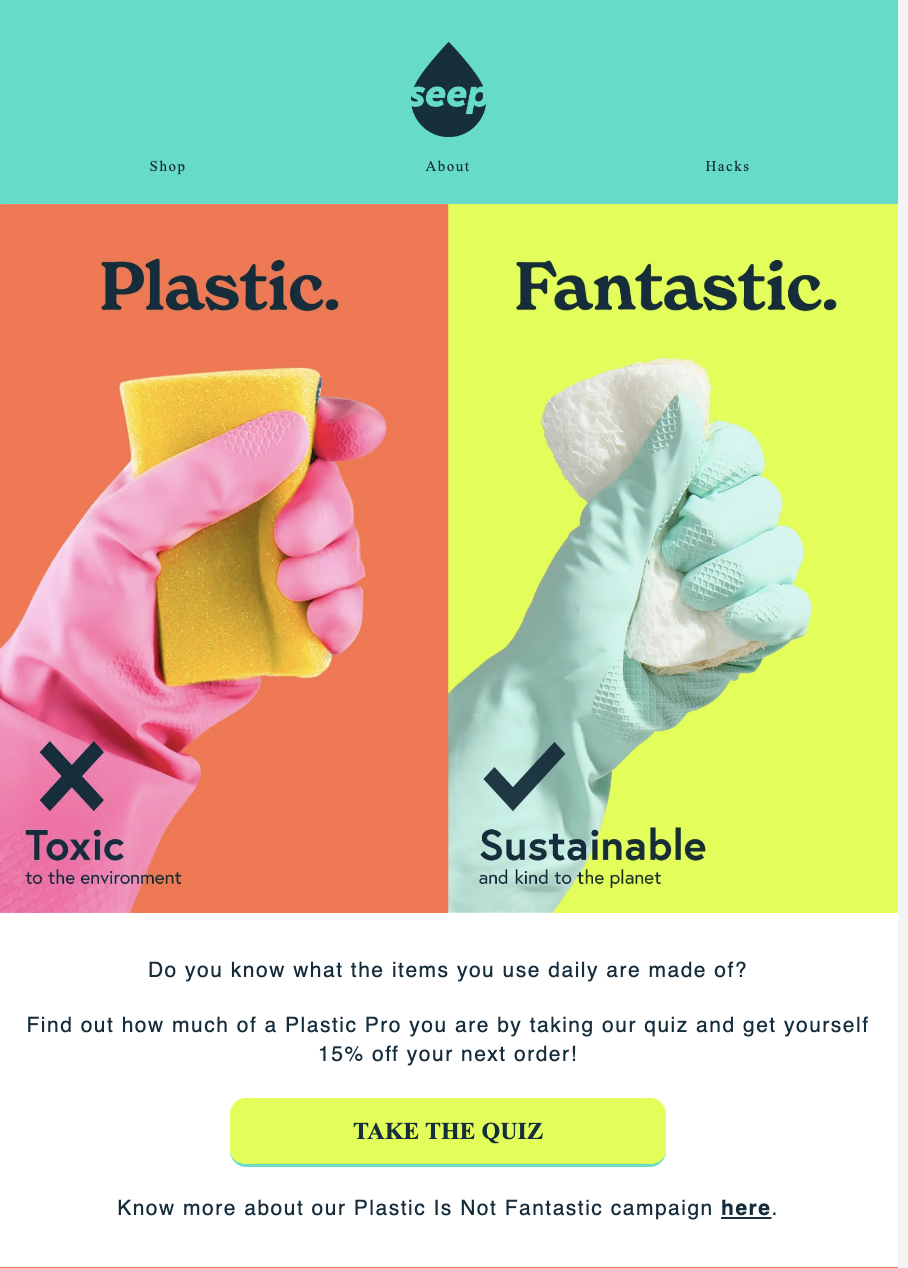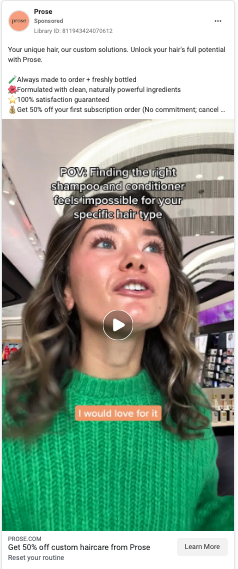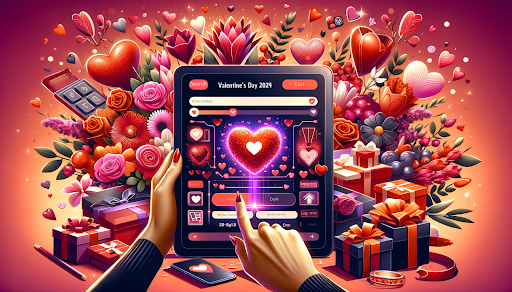Valentine's Day presents a huge opportunity for Ecommerce stores to boost sales.
According to a Valentine’s Day spending report from Capital One Research, consumers spent $25.9 billion for Valentine’s Day in 2023, 35% of which was online.
While the day may be centered around showing love and appreciation, Valentine’s Day is clearly a day of commerce.
And the National Retail Federation noted that consumers are not only gifting significant others but also pets, friends, and co-workers.
This showcases a broader interpretation of love and appreciation, and it also presents a huge sales opportunity for Ecommerce stores.
With so much competition, how does one stand out and capture those sales?
One proven strategy is by employing powerful and interactive Ecommerce quizzes.
In this post, we’ll dive into a quiz strategy for Valentine’s Day, to improve how your customers approach gifting on this special day.
The quiz could be as simple as a few questions, seamlessly leading them to a product they can purchase directly through Octane AI’s pop-up.
This Valentine's Day quiz strategy is not only a great way to re-engage customers post-holidays, but it's also an effective strategy to boost conversions and average order value, especially if you're looking to promote specific bundles.
Let’s dig in to how you can build this simple, evergreen quiz funnel ahead of Valentine’s Day.
Why Quizzes Work for Ecommerce Stores
Interactive content, like a quiz, will often outperform static content.
Mediafly found that while the pandemic increased content usage by 207%, interactive content saw 28% more views than static content and a 94% higher increase in views.
Interactive content sees more engagement, and time on site than static content.
Leveraging interactive content like quizzes is key to generating more leads, nurturing customer relationships, and bringing in more sales.
Quizzes Are Interactive and Fun, Keeping Visitors on Site Longer
The longer someone remains on your site, the more likely they will be invested in learning about your brand and move towards a purchase.
While “time on site” isn’t an official ranking factor for Google, SEO experts have demonstrated a significant correlation between dwell time and high search engine rankings.
It is a metric that assesses content quality by measuring the total time a user spends on a website after clicking on search results and before returning to the search engine results page. Longer user engagement on a webpage leads to higher dwell time.
Take a look at Harney & Sons’ tea-related quiz (built with Octane AI) as an example of a fun way to guide shoppers to the best tea.
The design is memorable and unique and the questions are extremely relevant depending on the different needs of each customer:
Ultimately, the depth of experience and personalization that quizzes provide resonate with customers far more than a static display of products.
2 Types of Quizzes to Create for Valentine's Day
The inquisitive nature of a quiz is a perfect engagement technique for a Valentine’s Day quiz – to learn more about the potential customer, capture their contact info, and recommend a product.
Here are a few ways that you can leverage quizzes for Valentine’s Day:
“Find Your Perfect Valentine's Gift” Quiz
This quiz format asks questions about personal preferences, wishes, and aspirational goals.
After all, Valentine’s Day is about creating special memories and moments to connect with loved ones.
For a "Find Your Perfect Valentine's Day Gift" quiz, you'll want a mix of fun, engaging, and insightful questions that help you understand the user's preferences, relationship status, and expectations for Valentine's Day.
This will enable you to recommend the most appropriate gifts, and in turn convert visitors into buyers.
Here's an idea of how you may want to structure this quiz:
1. Introduction & Engagement Questions
Example questions may be:
- "First things first, what's your name?"
- "Are you excited about Valentine's Day? (Yes/No/Maybe)"
- "What's your favorite thing about Valentine's Day?"
These questions can set a friendly tone and make the quiz feel more personalized.
You can use the responses to segment your email campaigns, addressing the customer by name and referencing their attitudes towards Valentine's Day for a more personalized touch in subsequent campaigns.
2. Relationship Status
Though this may be a bit more probing and personal, it captures the spirit of Valentine’s Day and the quiz. Some questions you may consider are:
- "Who is the lucky recipient of your Valentine's Day gift? (e.g., Partner, Friend, Family, Myself)"
- "How would you describe your relationship? (e.g., Romantic, Friendship, Family)"
- "How long have you been in this relationship? (e.g., Just started, A few months, Years)"
These questions help identify the target audience for specific gift categories (e.g., romantic partner vs. family). Remember that Valentine’s Day is now a gift-giving day for co-workers, friends, neighbors and more!
Tailor follow-up marketing messages and product recommendations based on the relationship status to increase relevance and likelihood of a purchase.
3. Personality & Preferences
You want to make sure that the quiz is fun and engaging, and you can make that shine through in this section. Capturing customer data points about their personality and preferences tie in to the Valentine’s Day theme, but also can inform your product recommendations.
Some questions could be:
- "Which word best describes your Valentine? (e.g., Romantic, Adventurous, Practical, Sentimental)"
- "What's their favorite way to spend a weekend? (e.g., Relaxing at home, Exploring outdoors, Trying new activities)"
- "What's a gift they've loved in the past? (e.g., Jewelry, Tech gadgets, Experiences)"
These questions can help you understand the recipient's personality to recommend gifts that resonate on a personal level.
Leverage this Zero Party Data to create segments in your email platform or ad targeting that cater to different personality types, enhancing the effectiveness of targeted marketing campaigns.
4. Gift Type & Specificity
Nailing down a good product recommendation requires narrowing down the array of gift options to those that align with the user's specific interests and desires.
You can do that with questions like:
- "What type of gift are you thinking about? (e.g., Something traditional, Something unique, An experience)"
- "Do they have any hobbies or passions that you'd like the gift to reflect? (e.g., Art, Cooking, Sports)"
- "What's the most important aspect of a gift for them? (e.g., Thoughtfulness, Usefulness, Surprise element)"
This data is critical in recommending the right products, and also ensuring relevant products in retargeting ads, email marketing, or even in creating personalized shopping experiences on your Shopify store.
5. Budget
Related to the gift specifications above, you also want to ensure that the recommendation is in the appropriate price range. You can do that by understanding the shopper’s budget:
- "What's your budget for this gift? (Provide ranges e.g., Under $50, $50-$100, $100-$200, $200+)"
- "Would you prefer a single impressive gift or multiple smaller gifts?"
You will increase the likelihood of conversion if you are able to narrow down the price point that is most feasible for the customer. Segment your customers based on their budget range for future marketing campaigns, ensuring that the products promoted to them fit their spending capacity.
These questions are designed to cover a broad spectrum of information, from personal preferences and relationship dynamics to practical considerations like budget and delivery.
The key is to keep the quiz engaging and friendly, ensuring that the questions flow naturally and are easy to answer.
Remember, the goal is to provide personalized recommendation that shows thoughtfulness and understanding of the recipient's tastes and needs.
Dafna Beauty has a quiz that covers some of these points, yet still leaves room for improvement:
“What’s Your Love Language”Quiz
Creating a "What's Your Love Language?" quiz based on the Five Love Languages concept is a fantastic idea for Valentine's Day.
This approach not only engages customers but also provides valuable insights for personalized gift recommendations.
Let's break down the themes, example questions, their importance, and how a Shopify merchant can utilize this data in marketing campaigns:
1. Words of Affirmation
When you are learning about your shopper, you can learn more about their communication preferences. Questions could be:
- "Do compliments from your partner make your day? (Yes, absolutely!, Sometimes, No, not really)"
- “How important is verbal affirmation in your relationship? (Very important, Somewhat important, Not that important, Doesn't matter to me("
These questions aren't necessarily related to the product you may sell, but of course is all about Valentine’s Day. This can help determine if the user values verbal expressions of love.
This could be a good question if you sell items like cards, books, or art with meaningful messages. In your follow up marketing campaigns, you can target customers with content that emphasizes the importance of expressing love through words.
2. Acts of Service
Part of a love language is learning how to serve others, primarily your partner. To learn about these, some example questions could be:
- "Do you feel most loved when your partner does something helpful for you? (Yes, acts of service mean a lot, Sometimes, It depends on the context, No, that’s not important to me)"
- "How do you value small acts of kindness in a relationship? (Very highly, I appreciate them greatly, They’re somewhat meaningful, Not much, they don’t matter to me)"
This can help you identify if the shopper values actions over words.
With this information, you can promote gifts that involve acts of service, like subscription services, home care products, or experience gifts that involve doing something for the partner.
Create campaigns that showcase how these products can ease life or bring comfort.
3. Receiving Gifts
How do they like to receive gifts? From this type of question, you can ask for information like:
- "Does receiving a gift make you feel especially appreciated? (Yes, gifts make me feel very appreciated, Sometimes gifts have that effect, Not really, gifts don't matter that much to me)"
- "How important are surprise gifts in your relationship? (Very important, I love surprise gifts, Somewhat important, I enjoy them but don't expect them, Not important at all)"
This can help you assess if the quiz taker sees gifts as a primary expression of love.
Use the quiz results, ie Zero Party Data, to recommend personalized gifts, limited editions, or exclusive items.
By integrating the love languages concept into your marketing strategy, you can create a more personalized shopping experience, increase customer engagement, and ultimately drive sales by providing customers with meaningful gift suggestions that truly resonate with their partners.
One related example may be from Le Jardin Retrouvé
4 Ways To Promote Your Valentine’s Day Quiz
Driving traffic to your quiz is essential for it to impact sales.
Here are some ideas on how you can maximize reach and get potential customers through the quiz.
Remember that a key part of the quiz funnel is to capture leads (email and SMS), and customer data (aka Zero Party Data).
Strategy #1: Promote on your Homepage
Place a prominent, eye-catching banner on your website's navigation menu or homepage. Here’s an example of how Doe Beauty places their quiz in the navigation bar, and on their homepage:
Strategy #2: Leverage Pop-ups
Implement a timed pop-up that invites visitors to take the quiz.
You can enhance your store's engagement by utilizing Octane AI's Pop-up feature, which allows for the creation of conversational pop-ups.
These interactive pop-ups not only gather valuable marketing data but also ask questions and make recommendations to your customers in a seamless flow.
Once a quiz is created, it can be added to a pop-up from the quiz's main page or the Pop-ups landing page.
There are two types of pop-ups available: Welcome Pop-up (for first-time visitors) and Exit Intent Pop-up (when someone tries to leave the website).
Both pop-up types can be customized in terms of layout, typography, colors, styles, and background images.
Pop-up behavior settings allow targeting specific devices and webpages.
Strategy #3: Email Marketing
Presumably you have already built up an email (and SMS) list–again that’s one of the primary benefits of a quiz!
Now it’s time to leverage that list, and send them a fun, interactive content piece to engage them.
You can get subscribers to your list to engage with the quiz by sending a quick email to your list.
Here’s an example of how a merchant promoted a quiz via email:

When crafting your email, you can create intrigue and curiosity with an engaging subject line like "Discover the Perfect Valentine's Gift for Your Loved One!".
After the quiz, segment your email list based on the results and send personalized follow-ups with product recommendations. Here is a detailed overview of how you can segment your Klaviyo list with Octane AI Data.
Strategy #4: Social Media Campaigns
Announce your timely Valentine’s Day quiz on your social media channels – you can post organic content, or run paid ads to increase reach.
Though not a Valentine’s Day quiz, Prose gets a lot of mileage out of promoting their quiz on social platforms, in this case Instagram ads:

Upon clicking the ad, you are taken directly to this page to begin the Prose quiz:
Promoting a Valentine's Day quiz on social media requires a well-thought-out strategy that captures attention, engages the audience, and drives traffic to your quiz.
When promoting it, focus on key elements such as the headline, offer, copy, creative visuals, and landing page to ensure that you are creating a unified, compelling, and valuable shopping experience throughout the quiz and website experience.
How To Position the Quiz for Maximum Impact
When promoting your Valentine's Day quiz, it's crucial to emphasize the fun element.
This means marketing the quiz not just as a tool, but as an enjoyable and engaging activity.
Highlight the excitement and joy in discovering the perfect gift through playful and lighthearted language. This approach encourages participation by making the process feel like a delightful part of the Valentine’s Day experience.
Equally important is to highlight personalization.
Highlight how the quiz offers a personalized opportunity to find a gift that's tailored specifically to the recipient's preferences and personality.
This not only adds value to the experience but also makes the gift-giver and recipient feel special.
By emphasizing that the quiz understands their specific needs and desires, you create a deeper emotional connection with your customers.
How To Convert Quiz Engagement into Sales
After successfully engaging customers with the quiz, the next step is to ensure a seamless shopping experience to ultimately purchase your product.
The transition from quiz completion to browsing relevant products should be smooth and intuitive. Direct quiz takers immediately to product pages that are relevant to their quiz results, making it easy for them to make a purchase decision.
Because you have captured key insights about their Valentine’s Day shopping goals, you can personalize the recommendations to reinforce how and why these products are ideal for their Valentine’s Day gifting.
Retargeting with specific products is a powerful strategy to implement as well.
Using retargeting ads that feature products aligned with the individual's quiz results keeps those items top-of-mind and gently nudges the customer towards completing a purchase.
This strategy is particularly effective because it reminds them of the personalized recommendations they received, reinforcing the idea that these products are specifically suited for their needs or the needs of their Valentine.
By focusing on these strategies, you’re not just promoting a quiz – you're creating an engaging, personalized shopping experience that resonates with your customers and effectively drives sales for your Shopify store.
Get Started On Your Valentine's Day Quiz
By utilizing a multi-channel marketing approach and focusing on personalization, you can effectively promote your quiz, engage your audience, and drive meaningful sales this Valentine's Day.
Remember, the goal is not just to sell products but to create a memorable experience that strengthens customer relationships and builds brand loyalty.
Plan to leverage your quiz around Valentine’s Day sales to prompt re-engagement from existing contacts while also attracting new high-intent traffic.
When thoughtfully implemented following the guidelines above, quizzes can deliver outstanding returns on investment through deeper customer insights and lifted sales.
Now that you’re fully equipped to create high-converting quizzes, book a demo with Octane AI to optimize visitor attention and drive more revenue from your Ecommerce store this Valentine’s Day!


